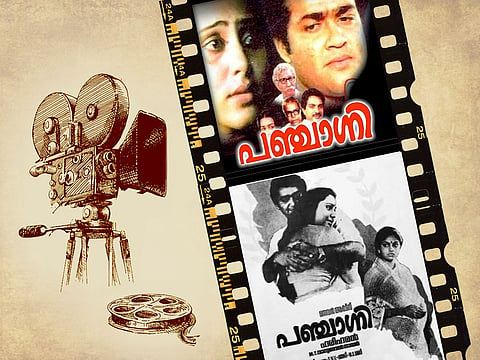Why Thudarum star Mohanlal and Geetha's 1986 'Panchagni' remains a timeless Malayalam classic that tackled Naxalism
MT Vasudevan Nair's classic set against naxalism is epic story on revolution, redemption

Dubai: Before 'girlboss' was even a thing, Malayalam cinema had Panchagni (1986) — with Geetha delivering a powerhouse performance that still gives us chills.
Penned by the iconic (and recently departed) M.T. Vasudevan Nair and directed by Hariharan, this blazing 1986 classic shook up the industry and our hearts.
The storyline? Gripping, to say the least. Set against the backdrop of the sporadic uprisings by left-wing extremists in 1970s and 80s India (yes, including Kerala), Panchagni dives headfirst into the chaos. In Kerala, there were chilling stories of landlords brutally murdered in their own homes, police stations attacked — the Naxals weren’t playing around.
Enter Indira (an on-point Geetha) : an educated young woman from an affluent Nair family who gets tangled up with a Naxal group responsible for the murder of landlord Avarachan. The price? A life sentence. The movie kicks off with her release on parole for 14 days after spending a good 8-9 years behind bars — all thanks to a hunger strike demanding a chance to see her ailing mother, a former freedom fighter who still had fire in her veins.
Panchagni paints a sharp, sometimes painfully honest picture of Indira’s return home: her mother (who can finally die in peace after seeing her daughter again), her elder brother (whose career went down the drain, courtesy of being related to a “murderess”), her loving sister Savithri and her husband (who, let's be real, probably once had eyes for Indira), her disillusioned younger brother Ravi, and her old friend Sharada (plus Sharada’s extremely problematic husband, Rajan).
Then there's Rashid (a dishy Mohanlal at his youthful best), the freelance journalist who wrote about Indira’s jail fast, nudging the powers-that-be to grant her parole. Rashid — an orphan crashing with the old-school journalist Ramettan — slowly breaks through Indira’s tough exterior, and a relationship blooms. Thanks to Ramettan’s political hookups, Rashid even manages to secure Indira’s remission. Happy ending, right?
Well, not so fast — this is Malayalam cinema, remember? Tragedy loves a cameo. Indira, on her way to share her good news with Sharada, catches Rajan and his gang red-handed, molesting a young maid. She snaps — and shoots Rajan dead.
Because let’s face it: if Malayalam filmmakers ever had to pick between a neat, happy ending and a gut-punch of harsh reality, they almost always chose the latter — and thrived on it.
Escapist fare? Not here. Instead, they held up a mirror to life, showing it in all its messy, unfair, brutally honest glory. Films like Panchagni didn’t gift-wrap hope and hand it to you with a bow; they made you sit with discomfort, feel the weight of choices, and realise that sometimes, no matter how much you fight, life can still sucker-punch you.
It’s what made Malayalam cinema so raw, so unforgettable — and frankly, so ahead of its time.
Plus, the sturdy acting ensemble including Geetha, Nadia Moidu, Mohanlal, Devan, and Thilakan deliver powerhouse performances, while M.T.’s emotionally loaded screenplay cements Panchagni as an all-time classic. And Bombay Ravi’s soul-stirring compositions wrapped around ONV’s poignant lyrics? Absolute magic.
"Ee Rathri Manju Poyi" isn’t just a song; it’s an emotion that sneaks up on you and refuses to leave. Honestly, it deserves a whole chapter (or maybe even its own fan club) for how effortlessly it serves up hope, heartbreak, and haunting beauty, all in one go. Bombay Ravi and ONV didn’t just create a soundtrack — they dropped an anthem for anyone who’s ever stared into the night sky and thought, “Well, life’s a mess, but maybe there's still hope.”
Sign up for the Daily Briefing
Get the latest news and updates straight to your inbox




